Russian-Japanese war could have been avoided
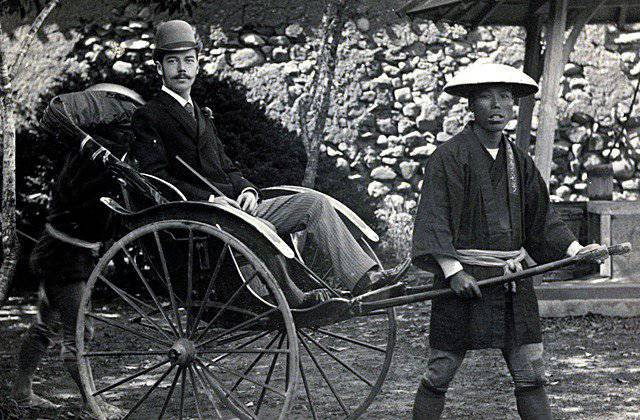
The Japanese offered Russia Manchuria, and to themselves - Korea; but the personal position of Nicholas II intervened in the peaceful division of territories in the Far East
In Russian historiography, the view is absolutely dominant that the hegemonic claims of the Japanese Empire in the Pacific did not leave for Russia the slightest chance of maintaining peace with this country in 1904 year. However the facts stories indicate the opposite: Japan in 1903 — 1904 made the maximum possible to avoid war with the “Russian giant”.
Impact Tsudy Sanzo as a factor in world history
Tsuda Sanzo police officer did not feel the unbearable heat. He was completely turned into sight and hearing - his nerves were stretched to the limit. Sanzo's right hand clutched a samurai katana sword.
A smiling, not very tall European approached. Exhausted from the damp heat, he continually straightened his wide-brimmed hat. It was evident that he was very tired and he was terribly tired of this official ceremony. Tsuda knew that this European was the son of the great Russian tsar, who lived somewhere in Siberia.
The royal descendant caught up with Tsuda. The samurai took two quick steps to the crown prince, snatching a katana out of its sheath as she went. Then it all started like a fast kaleidoscope.
The samurai sword flashed on the wave of the solar semicircle. Tsesarevich suddenly someone suddenly drew back. Katana whistled to the side of his awkward hat, slanting over her head and down her shoulder.
A precise blow to the temple with a bamboo cane that the Greek prince George struck samurai saved the terrible future of Tsar Nicholas II, and with it the bloody future of the Russian revolution.
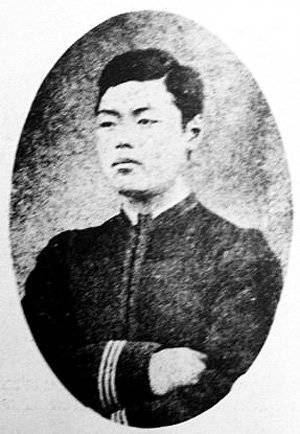
All contemporaries noted the strange femininity of the nature of Tsar Nicholas II. It manifested itself not in habits and appearance, but in deeds.
It was characteristic of the king, for example, to suddenly feel the hottest sympathy for a man, not for his business skills or valuable services, but in a purely female way: for good looks and good looks. Soft habits, the ability to stick out, the skills of a cheerful talk "about nothing" - often these qualities opened the way to the heart of the Russian monarch for nonentities and notorious adventurers. In contrast, Nicholas II could quietly and secretly, but very consistently, hate a person for the ability to show his willpower, for a special, directly expressed opinion, for unpleasant for the king, although truthful information.
The incident with the attack of Tsuda Sanzo literally shook the psyche of the young Tsarevich, the future Nicholas II. He hated the Japanese with a truly feminine fervor - the act of one samurai fanatic became firmly connected in his mind with the ethnic qualities of all Japanese. The fact of the punishment of Tsuda Sanzo with life imprisonment, the fact of the ban in the ancestral village of Tsuda to name children by this name, even the public appeals of the Japanese press to rename as punishment and repentance the city of Otsu (where the attack occurred) meant nothing to the Russian tsar. He sincerely and deeply offended. Henceforth and forever, the Japanese became for Nicholas II the most despised people - "cross-eyed macaques" - as he often called them with hatred.
The personal, extremely negative attitude of Nicholas II to Japan and the Japanese played a significant role in the fact that the bloody struggle between the Russians and the Japanese in the Far East did begin.
The main geopolitical goal of Japan
At the turn of the twentieth century, most of the leading world powers pursued mainly economic goals in the northern part of the Pacific Ocean. Only Japan and Russia fought here for the direct possession of vast territories. Moreover, if for the Russian Far Eastern lands were only “one hundred and the first pie” on the boundless dish of national lands, then for small island Japan, possession of the resources of continental lands became truly the most important condition for the further development of industry and the main productive forces of the country.
Of particular importance to Japan were the lands of neighboring Korea. The Japanese were separated from the "lilac country" only by the relatively narrow Korean Strait, which was easily overcome even by small transport launches.
In 1882, Japan enters its troops into Seoul - the capital of the Korean kingdom - under the pretext of the need to protect its diplomatic mission. In the autumn of 1895, the Japanese-funded Korean Reform Party is staging a coup in Seoul. The coup was organized by the Japanese envoy to Korea, General Miura Goro. The insurgents killed the reigning queen Ming, and her husband van Koejon was actually captured by the "reformers." It seemed that nothing more could prevent the process of a sharp increase in the influence of Japan in Korea.
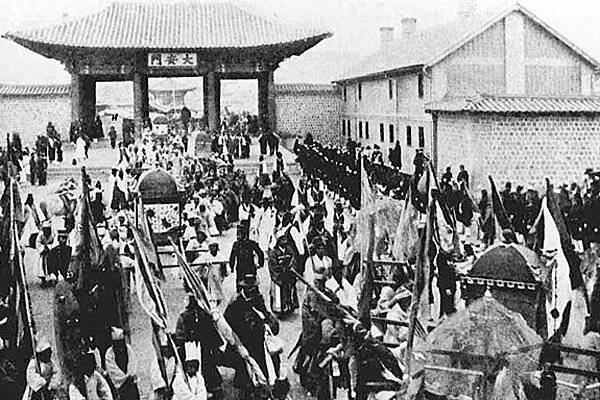
However, already at the beginning of February 1896 the Russian diplomatic mission, with the support of 200 sailors naval crew, managed to reverse the process. King Kodzhon escaped from captivity and, hiding in the building of the Russian diplomatic mission, gave the order to execute the rebels. The king’s order was rejoiced by the Koreans: a wave of murders of pro-Japanese officials swept through Seoul, and the “Korean Reform Party” was dispersed.
Thus, since the last decade of the nineteenth century, the main contradiction between Japan and Russia has been in the political and economic status of Korea. The Mikado foreign policy office saw the future of Korea only as a Japanese colony. Russia preferred to see Korea “de facto” as its colony, but since there was no strength for this, it agreed to the conditionally independent status of Korea, while maintaining here essential Russian positions.
There were also other contradictions between Japan and Russia, primarily due to the consistent strengthening of Japanese influence in China and the penetration of the Japanese into Manchuria. However, these contradictions were not fundamental for the Japanese. The transformation of Manchuria into an actual colony of Russia, subject to the complete withdrawal of the Russians from Korea, could well have been accepted by the foreign policy cabinet of the Land of the Rising Sun.
Qing Empire leaves Korea
By methodically strengthening its trade, economic and military presence in Korea, Japan could not help but face another strategic adversary, the Chinese Qing Empire. The Korean kingdom was traditionally regarded in Beijing as the closest vassal of China, in fact, as a dependent province. Nevertheless, the Japanese industry almost completely supplanted Chinese goods from Korea by 1894, while the number of Japanese in this country more than doubled the number of Chinese. The extremely sharp Japanese-Chinese controversy led to the 1894 — 1895 war.
The culmination of this war was the land and naval battles of January 30 - February 12 1895 of the largest Chinese fortress Weihaiwei.
During the naval phase of the battle, the Japanese fleet, under the command of Admiral Ito, which was smaller in terms of tonnage, methodically defeated the Chinese fleet of Admiral Dean Zhuchan. Having accepted the surrender terms proposed by the Japanese, Admiral Dean Zhuchan poisoned himself with a lethal dose of opium. The commander’s suicide caused a wave of suicides by the lower ranks of the Chinese fleet. Among others, the commander of the Zhenyuan battleship, Yang Yinglin, as well as the military commander of the Weihai Wei, General Dai Zongqian, shot himself to death.
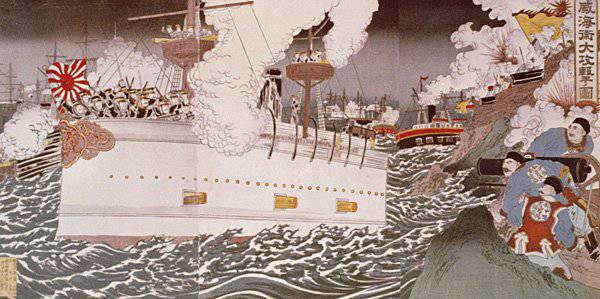
The disaster of the Chinese fleet at Weihaiwei handed over to the Japanese the entire Liaodong Peninsula with Port Arthur and Dairen. The Liaodong Peninsula, which was very prominent in the Yellow Sea, was not for nothing called at that time “the key to the castles of Korea and Manchuria,” who could control Liaodong, could control the entire north of Korea along the border with Manchuria.
In April, 1895, during the negotiations in Shimonoseki on the conditions for concluding a Japanese-Chinese peace treaty, the Japanese sternly voiced the demand to transfer the Liaodong Peninsula and Port Arthur to them. This requirement was no less firmly opposed by the Russian Empire, which relied on the support of virtually all European powers. Germany has become the main ally of Russia in this matter.
Kaiser Wilhelm II categorically supported Russian diplomacy. “Dearest Nick, I'm glad to show you,” the German Kaiser Nicholas II wrote these days, “how intertwined are our interests in the Far East: my ships received an order to follow yours, if necessary.”
The Japanese turned out to be a “hard nut to crack”: they put up with only part of the requirements of Russia and Germany. Japanese diplomacy agreed to clear Port Arthur and the north coast of the Liaodong Peninsula. At the same time, the Japanese secured the fact of the complete withdrawal of China from Korea in the text of the Shimonoseki peace treaty, and also annexed the island of Taiwan, the chain of the Pescadores islands and the south coast of Liaodong. A huge contribution of 4,7 billion yen was requested from China. Given the fact that the whole war with the Qing Empire cost Japan 233 million yen, one can understand how the Mikado citizens have greatly replenished their state budget.
Port Arthur as the ghost of Port Lazarev
In November 1897, a proposal to occupy Port Arthur and Dairen was discussed at a meeting of the Cabinet of Ministers of the Russian Empire, taking advantage of the fact that the Germans had recently seized the Chinese port of Zintau as a convenient pretext. Nicholas II, as usual, took a vague position. Finance Minister S.Yu. Witte was categorically opposed, pointing out that the annexation of Port Arthur would turn China “from a country extremely located and friendly to us - into a country that hates us, owing to our perfidy”. As a result of the unclear position of the king, no final decision was made.
Within a few days, to the dismay of Witte, Emperor Nicholas II sent a squadron of warships to capture Port Arthur. The argument of the king was unproven: allegedly there were fears that the British could have captured Port Arthur. In his memoirs, S. Yu. Witte writes that he never believed in the rumors about the "port-arthur intrigues of the British."
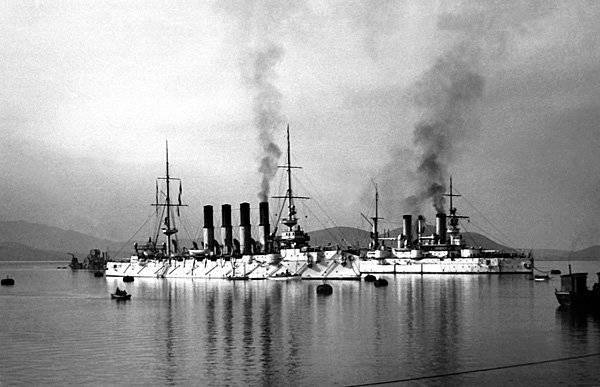
In his opinion, the decision to seize the main naval port in Liaodong was dictated solely by the personal desire of Nicholas II to “strongly annoy the hated Japanese.”
Mikado Meiji and the entire Japanese generals were shocked by Russia's seizure of Port Arthur and Dairen. In this military-political act, the Japanese saw a grave threat to their strategic position on the Korean Peninsula. In the presence of Port Arthur, he saw another ambitious project promoted by the Russian Empire, the construction of a commercial Port Lazarev (Sonjonman, Wonsan) on the east coast of Korea. Lazarev port squeezed Korea in the stiff clutches of the “Russian bear”: the Russians would control the east and west of the Korean Peninsula, while hanging from the north - from Manchuria. From the point of view of the Japanese General Staff, only a victorious war with Russia could prevent such a catastrophe.
"Immature strategy is the cause of sadness"
In addition to this maxim, amazing in its depth of thought, the ancient Chinese philosopher Confucius has another, also valuable. “There is nothing more dangerous,” the sage argued, “than to resort to force without being prepared.”
Unfortunately, both of these maxims were completely ignored by the Russian Tsar and his General Staff until the beginning of the military battle with the Japanese in 1904.
At the end of April, 1902, the Minister of War of Russia, General A. N. Kuropatkin, was invited to visit Japan. This invitation was, of course, not without purpose: the activity of the Russians in Korea began to instill serious fears in the Japanese. Nicholas II acted in Korea according to the principle of the ancient Russian fairy-tale character "Tyan-Pushing", that is, in two opposite directions. In Korea, the Russian economic presence was sharply strengthened: the so-called “Bezobrazovskaya clique” began massive logging here and even transferred two brigades of soldiers to the Korean Yalu River. On the other hand, the tsar instructed the Russian diplomatic mission in Tokyo to achieve a definite peace agreement with the Japanese, which, given the presence of Russian activity in Korea, was by definition impossible.
For their part, the Japanese also strove for certainty: Japanese diplomats hoped to achieve this from the Russians during the Kuropatkin trip. The Russian military minister was greeted solemnly, perhaps even pompously. Kuropatkin examined all the military objects he wanted in Japan. Under him, General Terauchi Masatake, Minister of War of Mikado, was constantly, almost like an orderly. The Russian minister had several meetings and talked with the Japanese Prime Minister Katsura for a long time. The Japanese clearly wanted to show Kuropatkin that there were no insoluble problems between Russia and Japan, provided that the vital interests of the Mikado Empire in Korea were taken into account.
Unfortunately, Kuropatkin’s mission turned out to be meaningless: he himself had no foreign policy authority, and Nicholas II routinely pretended that he did not notice the underlined courtesy of the Japanese.
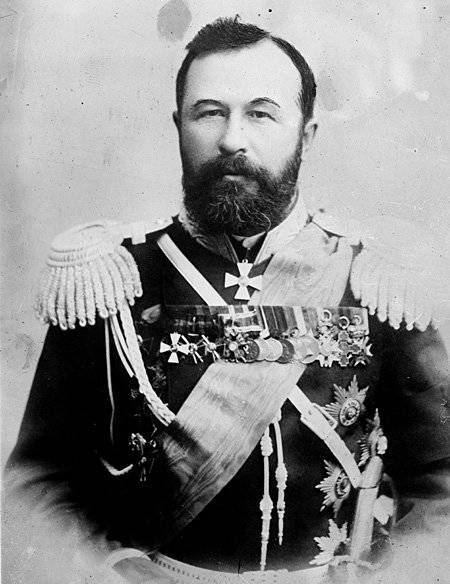
After the failure of the Kuropatkin mission, Japan increasingly began to demand the withdrawal of Russian troops from Korea and Manchuria. These demarches of the Japanese caused in Russia a common, alas, for the Russian history, “cap-sacking” slapstick. Newspapers were full of statements that “Russia cannot be defeated!”, Because who in the world does not know that “Russian Cossack will quickly rip off the yellow skin!” military and political elite of St. Petersburg, close to the king and the General Staff.
However, in the Russian capital remained people who have not lost their sense of reality. True, they were all pushed aside by the personal position of Tsar Nicholas II to the periphery of the formation of Russian policy towards Japan.
One of those few was Foreign Minister V. N. Lamsdorf, an exceptionally competent diplomat from the Ostsee Germans. On a Japanese note from 12 August 1903 of the year, once again offering Russians realistically to divide spheres of influence in the Far East, Lamsdorf wrote: "Mutual understanding between our countries is not only desirable, but is the best policy." It is possible that it was precisely because of this resolution that V. N. Lamsdorf was soon the decision of Nicholas II to withdraw from any participation in the peace negotiations with Japan.
While the guns were silent
In December 1903, the Japanese take another, third, step in the search for a compromise with Russia. In a special memorandum of the Ministry of Foreign Affairs of Japan, Russians are offered complete freedom of hands (including all military and economic aspects) in Manchuria, if the same situation is recognized by Russian diplomacy for Japan in Korea.
Even Ye. I. Alekseev, a tsarist governor in the Far East, who was prone to “capturing”, had very limited strategic thinking, and he understood that the Japanese were embarking on the maximum possible, in fact very beneficial for Russia, strategic compromise. “I believe that this proposal is the maximum possible from the Japanese side,” the governor Alekseev wrote in the report to the tsar, “the Japanese will never go further than him, and do we really need it?”
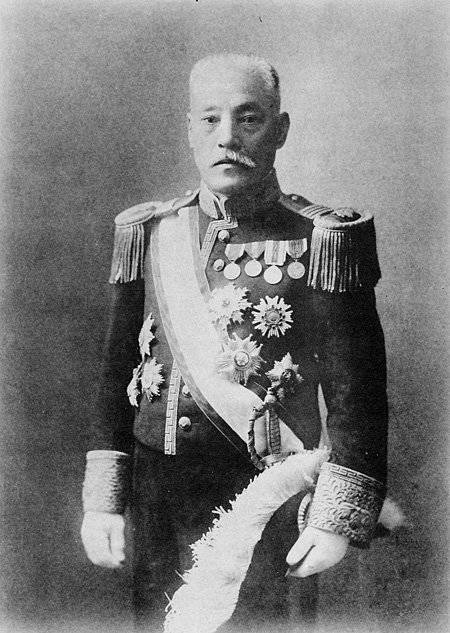
War Minister A. N. Kuropatkin, at about the same time, tried to induce Nicholas II to a sense of reality. “The economic interests of Russia,” said Kuropatkin in a report to Tsar, “are very insignificant in the south of the Far East. Success or failure to use several coal mines or woodworking enterprises is not so important as to take the risk of a war with Japan. ”
Nicholas II responded to the December proposal of the Japanese, as well as to the relevant reports of his dignitaries, with profound silence.
Under these conditions, the Japanese government decided on the fourth, truly unprecedented step in the search for a compromise with Russia.
Minister Kurino, the special envoy of Japan in St. Petersburg, personally addressed Foreign Minister VN Lamsdorf with a proposal to quickly divide the spheres of influence of the two powers in the Far East. A simple, reasonable, advantageous for both states principle: Manchuria - to Russia, and Korea - to Japan, - Minister Kurino was personally voiced by Minister Lamsdorf four times! World diplomatic practice knows a little of such examples.
It is important to note that the compromise proposed by Russia was very difficult for the Japanese government. In Japan, the influence of the militarist circles of the army and navy, already ready for war, sharply increased, most political parties demanded that the Russian bear, who had become wilted in sake, be replaced with an armed hand.
“We are going to fight with Russia. I did not want this "
The final diplomatic drama was held at the Tsar's Ball in the Winter Palace. Ambassador Kurino, clearly in a state of undisguised agitation, approached Finance Minister S. Y. Witte, who was valued in Japan for his anti-war stance. “Japan is on the edge of its patience,” said Kurino, “if we don’t get a quick and definite answer to our proposals, then hostilities will break out.” To Witte's credit, he conveyed the words of Kurino to Minister of Foreign Affairs Lamsdorf on the same day.
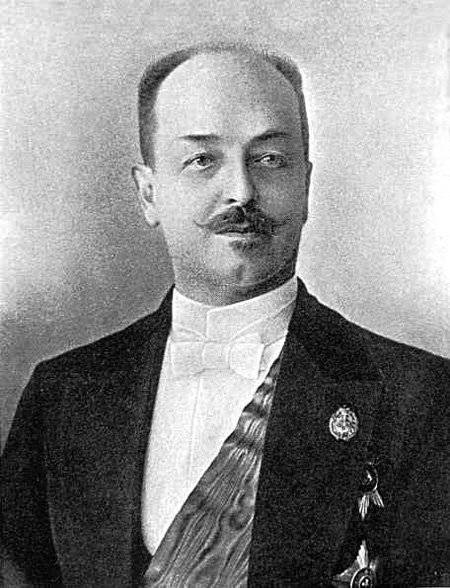
“I can’t do anything,” replied the glossed Lamsdorf, “I have already reported to the Sovereign, but he is silent. In addition, I actually do not take part in the negotiations. "
Not only Minister Lamsdorf tried to “wake up” the Russian tsar, who secretly cherished, apparently, the opportunity to get even with the “squinted-eyed Japs” for the blow of Tsuda Sanzo. German Kaiser Wilhelm II still 19 January 1904, the Russian emperor sent a secret dispatch. "I received information from trustworthy Chinese sources," the Kaiser wrote with alarm, "the governors of the Yangtze Valley report that a war between Japan and Russia is inevitable."
On February 4, 1904, the Japanese government’s reserve of patience was exhausted. On this day, the Ministry of Foreign Affairs of Russia stated that in view of the obvious impossibility of compromise, the Japanese ambassador left St. Petersburg. The reaction of Nicholas II and the Russian Foreign Ministry, respectively, was not followed again.
On the eighth of February, the emperor Meiji, returning from a meeting of the highest state dignitaries, said to his wife, “So, we are going to fight with Russia. I didn't want that. But it is already impossible to restrain movement to this. If we fail, how will I face the people? ”
On the night of February with the 9 on 10 February, the Minister of Foreign Affairs, Count Vladimir Lamsdorf, was raised from his bed as a courier service officer. Standing in his robe, the minister quickly glanced through the telegram of the tsar's governor in the Far East, Admiral Alekseyev. The telegram informed about the destruction of the best ships of the Far Eastern squadron in Port Arthur by Japanese destroyers. “They played it the same way!” - with one phrase Lamsdorf answered a dumb question in the eyes of the courier. Alas, this phrase can be considered the true motto of the entire reign of Emperor Nicholas II.
Information